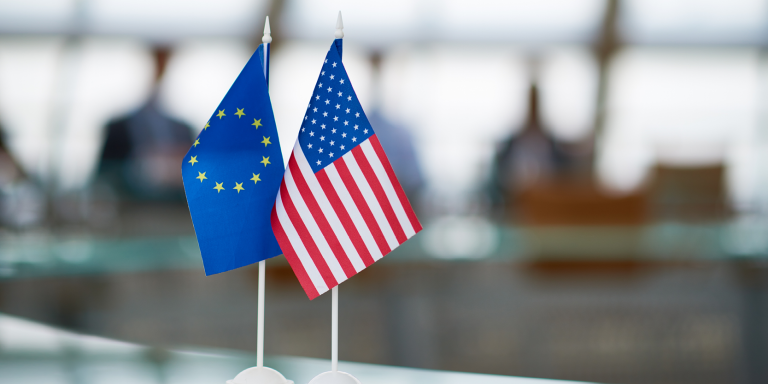
The EU-U.S. Trade and Technology Council (TCC) was launched by European Commission President Ursula von der Leyen and U.S. President Joe Biden at the EU-U.S. Summit in Brussels on June 15, 2021. The third ministerial meeting of the TCC was held on Monday, December 5 in College Park, Maryland.
The Council meets periodically at the political level to steer cooperation. It is co-chaired by Margrethe Vestager, Executive Vice President of the European Commission and Commissioner for Competition, Valdis Dombrovskis, Executive Vice President of the European Commission, and on the U.S. side by Antony Blinken, U.S. Secretary of State, Gina Raimondo, Secretary of Commerce, and Katherine Tai, Trade Representative.
The TCC is a forum for the EU and the United States to coordinate their approaches to key trade, technology and security issues in order to deepen transatlantic cooperation.
Ten working groups have been established that address the following areas
- Cooperation on technology standards (including artificial intelligence and the Internet of Things, among other emerging technologies);
- Climate and green technologies;
- Secure supply chains, including semiconductors;
- ICT security and competitiveness;
- Data governance and technology platforms;
- Misuse of technologies that threaten security and human rights;
- Export controls;
- Investment Screening;
- Promoting SME access to and use of digital technologies;.
- Global Trade Challenges.
Progress on the third edition
Both sides took stock of the work of the EU-US working group on the Inflation Reduction Act (IRA) which Emmanuel Macron discussed with Joe Biden during his visit to Washington last week. The EU reiterated its strong concerns about the IRA’s discriminatory provisions and distorting subsidies.
Digital infrastructure and connectivity
In the current geopolitical climate, critical Internet infrastructure is at increasing risk. The EU and U.S. will work to facilitate projects that strengthen the resilience of infrastructure such as strategic land and submarine cables.
Both sides also support secure and resilient digital connectivity in partner countries. More than 1,000 Jamaican public schools and children’s homes will be connected, and a similar project will be implemented in Kenya, in partnership with the government, to connect schools in remote areas via fiber optics.
Cooperation in emerging technologies
The two sides have established a joint roadmap to develop common tools and standards for trusted AI. These standards will address critical areas such as post-quantum cryptography and IOT cybersecurity. The EU and U.S. will work on research and development in quantum technologies to promote trade and remove barriers to transatlantic trade.
To accelerate the adoption of electric vehicles, they will develop a common international standard on megawatt charging systems for heavy-duty vehicles, to be adopted by 2024. The EU and U.S. also intend to develop recommendations on public charging infrastructure for electromobility in 2023.
Building resilient semiconductor supply chains
Russian aggression against Ukraine has put considerable pressure on global supply chains. The EU and the U.S. signed two agreements on an early warning mechanism to stem and mitigate disruptions in the semiconductor supply chain, as well as a commitment to reciprocal transparency on subsidies to avoid subsidy races.
Promote their values globally and engage with their partners
The EU and the United States promote their values worldwide through an open, free, global, interoperable, reliable and secure Internet. They adopted a joint statement on the protection of human rights defenders online and presented the first report of the expert group on the impact of government-imposed Internet suspensions on citizens.
The two sides will pool digital resources such as AI models and computing power to address key challenges in the areas of climate change and extreme weather forecasting, health or smart agriculture, and make these public goods available to partner countries.
Intensify transatlantic efforts to promote sustainable trade
The EU and the United States will launch a transatlantic initiative on sustainable trade. They intend to explore areas of cooperation to decarbonize their energy-intensive industries and facilitate the deployment of goods and services essential to the transition to more circular and climate-neutral economies.
Enhancing security through export controls and investment screening
Cooperation in the CTC has been instrumental in the rapid and harmonized implementation of advanced technology export controls against Russia. The EU and U.S. will continue to cooperate in this area, including on information exchange.
The parties continue to discuss investment screening, focusing on the security risks posed by certain investments in sensitive technologies. They will also explore policy instruments that could be used to address non-market-based economic policies and practices and examine possible joint actions to address economic coercion.
Continued Growth in Transatlantic Trade
Transatlantic trade is the largest bilateral trade relationship in the world, with trade worth over €1 trillion. To accelerate its development, new impetus will be given to the extension of the Mutual Recognition Agreement (MRA) on marine equipment and the MRA on pharmaceutical products (vaccines). In addition, the ministers supported efforts in the area of conformity assessment, primarily in the context of discussions on the machinery sector.
Ministers supported the idea of digitizing existing MRAs and increasing their attractiveness. A pilot project on digital tool initiatives will be set up to reduce trade-related red tape.
Cultivating talent for the digital transition
The promotion of digital talent and skills is a key pillar of the digital transition. The EU and the U.S. intend to launch a “Talent for Growth” working group.
Translated from Coopération transatlantique : Avancées de la 3ème édition du Conseil du Commerce et des Technologies UE-États-Unis









